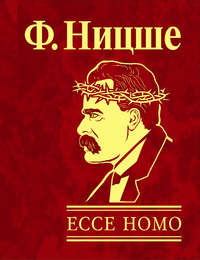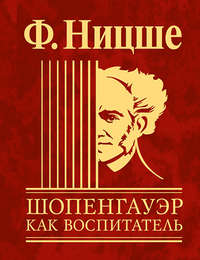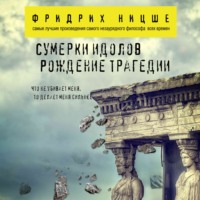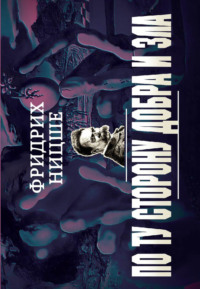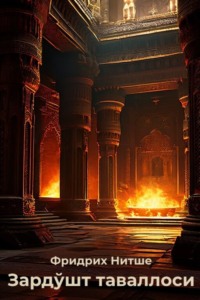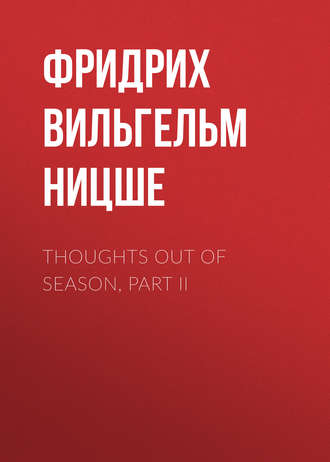 полная версия
полная версияThoughts Out of Season, Part II
I am only speaking, directly, about the Germans of the present day, who have had to suffer more than other people from the feebleness of personality and the opposition of substance and form. “Form” generally implies for us some convention, disguise or hypocrisy, and if not hated, is at any rate not loved. We have an extraordinary fear of both the word convention and the thing. This fear drove the German from the French school; for he wished to become more natural, and therefore more German. But he seems to have come to a false conclusion with his “therefore.” First he ran away from his school of convention, and went by any road he liked: he has come ultimately to imitate voluntarily in a slovenly fashion, what he imitated painfully and often successfully before. So now the lazy fellow lives under French conventions that are actually incorrect: his manner of walking shows it, his conversation and dress, his general way of life. In the belief that he was returning to Nature, he merely followed caprice and comfort, with the smallest possible amount of self-control. Go through any German town; you will see conventions that are nothing but the negative aspect of the national characteristics of foreign states. Everything is colourless, worn out, shoddy and ill-copied. Every one acts at his own sweet will – which is not a strong or serious will – on laws dictated by the universal rush and the general desire for comfort. A dress that made no head ache in its inventing and wasted no time in the making, borrowed from foreign models and imperfectly copied, is regarded as an important contribution to German fashion. The sense of form is ironically disclaimed by the people – for they have the “sense of substance”: they are famous for their cult of “inwardness.”
But there is also a famous danger in their “inwardness”: the internal substance cannot be seen from the outside, and so may one day take the opportunity of vanishing, and no one notice its absence, any more than its presence before. One may think the German people to be very far from this danger: yet the foreigner will have some warrant for his reproach that our inward life is too weak and ill-organised to provide a form and external expression for itself. It may in rare cases show itself finely receptive, earnest and powerful, richer perhaps than the inward life of other peoples; but, taken as a whole, it remains weak, as all its fine threads are not tied together in one strong knot. The visible action is not the self-manifestation of the inward life, but only a weak and crude attempt of a single thread to make a show of representing the whole. And thus the German is not to be judged on any one action, for the individual may be as completely obscure after it as before. He must obviously be measured by his thoughts and feelings, which are now expressed in his books; if only the books did not, more than ever, raise the doubt whether the famous inward life is still really sitting in its inaccessible shrine. It might one day vanish and leave behind it only the external life, – with its vulgar pride and vain servility, – to mark the German. Fearful thought! – as fearful as if the inward life still sat there, painted and rouged and disguised, become a play-actress or something worse; as his theatrical experience seems to have taught the quiet observer Grillparzer, standing aside as he did from the main press. “We feel by theory,” he says. “We hardly know any more how our contemporaries give expression to their feelings: we make them use gestures that are impossible nowadays. Shakespeare has spoilt us moderns.”
This is a single example, its general application perhaps too hastily assumed. But how terrible it would be were that generalisation justified before our eyes! There would be then a note of despair in the phrase, “We Germans feel by theory, we are all spoilt by history;” – a phrase that would cut at the roots of any hope for a future national culture. For every hope of that kind grows from the belief in the genuineness and immediacy of German feeling, from the belief in an untarnished inward life. Where is our hope or belief, when its spring is muddied, and the inward quality has learned gestures and dances and the use of cosmetics, has learned to express itself “with due reflection in abstract terms,” and gradually lose itself? And how should a great productive spirit exist among a nation that is not sure of its inward unity and is divided into educated men whose inner life has been drawn from the true path of education, and uneducated men whose inner life cannot be approached at all? How should it exist, I say, when the people has lost its own unity of feeling, and knows that the feeling of the part calling itself the educated part and claiming the right of controlling the artistic spirit of the nation, is false and hypocritical? Here and there the judgment and taste of individuals may be higher and finer than the rest, but that is no compensation: it tortures a man to have to speak only to one section and be no longer in sympathy with his people. He would rather bury his treasure now, in disgust at the vulgar patronage of a class, though his heart be filled with tenderness for all. The instinct of the people can no longer meet him half-way; it is useless for them to stretch their arms out to him in yearning. What remains but to turn his quickened hatred against the ban, strike at the barrier raised by the so-called culture, and condemn as judge what blasted and degraded him as a living man and a source of life? He takes a profound insight into fate in exchange for the godlike desire of creation and help, and ends his days as a lonely philosopher, with the wisdom of disillusion. It is the painfullest comedy: he who sees it will feel a sacred obligation on him, and say to himself, – “Help must come: the higher unity in the nature and soul of a people must be brought back, the cleft between inner and outer must again disappear under the hammer of necessity.” But to what means can he look? What remains to him now but his knowledge? He hopes to plant the feeling of a need, by speaking from the breadth of that knowledge, giving it freely with both hands. From the strong need the strong action may one day arise. And to leave no doubt of the instance I am taking of the need and the knowledge, my testimony shall stand, that it is German unity in its highest sense which is the goal of our endeavour, far more than political union: it is the unity of the German spirit and life after the annihilation of the antagonism between form and substance, inward life and convention.
V
An excess of history seems to be an enemy to the life of a time, and dangerous in five ways. Firstly, the contrast of inner and outer is emphasised and personality weakened. Secondly, the time comes to imagine that it possesses the rarest of virtues, justice, to a higher degree than any other time. Thirdly, the instincts of a nation are thwarted, the maturity of the individual arrested no less than that of the whole. Fourthly, we get the belief in the old age of mankind, the belief, at all times harmful, that we are late survivals, mere Epigoni. Lastly, an age reaches a dangerous condition of irony with regard to itself, and the still more dangerous state of cynicism, when a cunning egoistic theory of action is matured that maims and at last destroys the vital strength.
To return to the first point: the modern man suffers from a weakened personality. The Roman of the Empire ceased to be a Roman through the contemplation of the world that lay at his feet; he lost himself in the crowd of foreigners that streamed into Rome, and degenerated amid the cosmopolitan carnival of arts, worships and moralities. It is the same with the modern man, who is continually having a world-panorama unrolled before his eyes by his historical artists. He is turned into a restless, dilettante spectator, and arrives at a condition when even great wars and revolutions cannot affect him beyond the moment. The war is hardly at an end, and it is already converted into thousands of copies of printed matter, and will be soon served up as the latest means of tickling the jaded palates of the historical gourmets. It seems impossible for a strong full chord to be prolonged, however powerfully the strings are swept: it dies away again the next moment in the soft and strengthless echo of history. In ethical language, one never succeeds in staying on a height; your deeds are sudden crashes, and not a long roll of thunder. One may bring the greatest and most marvellous thing to perfection; it must yet go down to Orcus unhonoured and unsung. For art flies away when you are roofing your deeds with the historical awning. The man who wishes to understand everything in a moment, when he ought to grasp the unintelligible as the sublime by a long struggle, can be called intelligent only in the sense of Schiller's epigram on the “reason of reasonable men.” There is something the child sees that he does not see; something the child hears that he does not hear; and this something is the most important thing of all. Because he does not understand it, his understanding is more childish than the child's and more simple than simplicity itself; in spite of the many clever wrinkles on his parchment face, and the masterly play of his fingers in unravelling the knots. He has lost or destroyed his instinct; he can no longer trust the “divine animal” and let the reins hang loose, when his understanding fails him and his way lies through the desert. His individuality is shaken, and left without any sure belief in itself; it sinks into its own inner being, which only means here the disordered chaos of what it has learned, which will never express itself externally, being mere dogma that cannot turn to life. Looking further, we see how the banishment of instinct by history has turned men to shades and abstractions: no one ventures to show a personality, but masks himself as a man of culture, a savant, poet or politician.
If one take hold of these masks, believing he has to do with a serious thing and not a mere puppet-show – for they all have an appearance of seriousness – he will find nothing but rags and coloured streamers in his hands. He must deceive himself no more, but cry aloud, “Off with your jackets, or be what you seem!” A man of the royal stock of seriousness must no longer be Don Quixote, for he has better things to do than to tilt at such pretended realities. But he must always keep a sharp look about him, call his “Halt! who goes there?” to all the shrouded figures, and tear the masks from their faces. And see the result! One might have thought that history encouraged men above all to be honest, even if it were only to be honest fools: this used to be its effect, but is so no longer. Historical education and the uniform frock-coat of the citizen are both dominant at the same time. While there has never been such a full-throated chatter about “free personality,” personalities can be seen no more (to say nothing of free ones); but merely men in uniform, with their coats anxiously pulled over their ears. Individuality has withdrawn itself to its recesses; it is seen no more from the outside, which makes one doubt if it be possible to have causes without effects. Or will a race of eunuchs prove to be necessary to guard the historical harem of the world? We can understand the reason for their aloofness very well. Does it not seem as if their task were to watch over history to see that nothing comes out except other histories, but no deed that might be historical; to prevent personalities becoming “free,” that is, sincere towards themselves and others, both in word and deed? Only through this sincerity will the inner need and misery of the modern man be brought to the light, and art and religion come as true helpers in the place of that sad hypocrisy of convention and masquerade, to plant a common culture which will answer to real necessities, and not teach, as the present “liberal education” teaches, to tell lies about these needs, and thus become a walking lie one's self.
In such an age, that suffers from its “liberal education,” how unnatural, artificial and unworthy will be the conditions under which the sincerest of all sciences, the holy naked goddess Philosophy, must exist! She remains, in such a world of compulsion and outward conformity, the subject of the deep monologue of the lonely wanderer or the chance prey of any hunter, the dark secret of the chamber or the daily talk of the old men and children at the university. No one dare fulfil the law of philosophy in himself; no one lives philosophically, with that single-hearted virile faith that forced one of the olden time to bear himself as a Stoic, wherever he was and whatever he did, if he had once sworn allegiance to the Stoa. All modern philosophising is political or official, bound down to be a mere phantasmagoria of learning by our modern governments, churches, universities, moralities and cowardices: it lives by sighing “if only…” and by knowing that “it happened once upon a time…” Philosophy has no place in historical education, if it will be more than the knowledge that lives indoors, and can have no expression in action. Were the modern man once courageous and determined, and not merely such an indoor being even in his hatreds, he would banish philosophy. At present he is satisfied with modestly covering her nakedness. Yes, men think, write, print, speak and teach philosophically: so much is permitted them. It is only otherwise in action, in “life.” Only one thing is permitted there, and everything else quite impossible: such are the orders of historical education. “Are these human beings,” one might ask, “or only machines for thinking, writing and speaking?”
Goethe says of Shakespeare: “No one has more despised correctness of costume than he: he knows too well the inner costume that all men wear alike. You hear that he describes Romans wonderfully; I do not think so: they are flesh-and-blood Englishmen; but at any rate they are men from top to toe, and the Roman toga sits well on them.” Would it be possible, I wonder, to represent our present literary and national heroes, officials and politicians as Romans? I am sure it would not, as they are no men, but incarnate compendia, abstractions made concrete. If they have a character of their own, it is so deeply sunk that it can never rise to the light of day: if they are men, they are only men to a physiologist. To all others they are something else, not men, not “beasts or gods,” but historical pictures of the march of civilisation, and nothing but pictures and civilisation, form without any ascertainable substance, bad form unfortunately, and uniform at that. And in this way my thesis is to be understood and considered: “only strong personalities can endure history, the weak are extinguished by it.” History unsettles the feelings when they are not powerful enough to measure the past by themselves. The man who dare no longer trust himself, but asks history against his will for advice “how he ought to feel now,” is insensibly turned by his timidity into a play-actor, and plays a part, or generally many parts, – very badly therefore and superficially. Gradually all connection ceases between the man and his historical subjects. We see noisy little fellows measuring themselves with the Romans as though they were like them: they burrow in the remains of the Greek poets, as if these were corpora for their dissection – and as vilia as their own well-educated corpora might be. Suppose a man is working at Democritus. The question is always on my tongue, why precisely Democritus? Why not Heraclitus, or Philo, or Bacon, or Descartes? And then, why a philosopher? Why not a poet or orator? And why especially a Greek? Why not an Englishman or a Turk? Is not the past large enough to let you find some place where you may disport yourself without becoming ridiculous? But, as I said, they are a race of eunuchs: and to the eunuch one woman is the same as another, merely a woman, “woman in herself,” the Ever-unapproachable. And it is indifferent what they study, if history itself always remain beautifully “objective” to them, as men, in fact, who could never make history themselves. And since the Eternal Feminine could never “draw you upward,” you draw it down to you, and being neuter yourselves, regard history as neuter also. But in order that no one may take any comparison of history and the Eternal Feminine too seriously, I will say at once that I hold it, on the contrary, to be the Eternal Masculine: I only add that for those who are “historically trained” throughout, it must be quite indifferent which it is; for they are themselves neither man nor woman, nor even hermaphrodite, but mere neuters, or, in more philosophic language, the Eternal Objective.
If the personality be once emptied of its subjectivity, and come to what men call an “objective” condition, nothing can have any more effect on it. Something good and true may be done, in action, poetry or music: but the hollow culture of the day will look beyond the work and ask the history of the author. If the author have already created something, our historian will set out clearly the past and the probable future course of his development, he will put him with others and compare them, and separate by analysis the choice of his material and his treatment; he will wisely sum the author up and give him general advice for his future path. The most astonishing works may be created; the swarm of historical neuters will always be in their place, ready to consider the authors through their long telescopes. The echo is heard at once: but always in the form of “criticism,” though the critic never dreamed of the work's possibility a moment before. It never comes to have an influence, but only a criticism: and the criticism itself has no influence, but only breeds another criticism. And so we come to consider the fact of many critics as a mark of influence, that of few or none as a mark of failure. Actually everything remains in the old condition, even in the presence of such “influence”: men talk a little while of a new thing, and then of some other new thing, and in the meantime they do what they have always done. The historical training of our critics prevents their having an influence in the true sense, an influence on life and action. They put their blotting paper on the blackest writing, and their thick brushes over the gracefullest designs; these they call “corrections”; – and that is all. Their critical pens never cease to fly, for they have lost power over them; they are driven by their pens instead of driving them. The weakness of modern personality comes out well in the measureless overflow of criticism, in the want of self-mastery, and in what the Romans called impotentia.
VI
But leaving these weaklings, let us turn rather to a point of strength for which the modern man is famous. Let us ask the painful question whether he has the right in virtue of his historical “objectivity” to call himself strong and just in a higher degree than the man of another age. Is it true that this objectivity has its source in a heightened sense of the need for justice? Or, being really an effect of quite other causes, does it only have the appearance of coming from justice, and really lead to an unhealthy prejudice in favour of the modern man? Socrates thought it near madness to imagine one possessed a virtue without really possessing it. Such imagination has certainly more danger in it than the contrary madness of a positive vice. For of this there is still a cure; but the other makes a man or a time daily worse, and therefore more unjust.
No one has a higher claim to our reverence than the man with the feeling and the strength for justice. For the highest and rarest virtues unite and are lost in it, as an unfathomable sea absorbs the streams that flow from every side. The hand of the just man, who is called to sit in judgment, trembles no more when it holds the scales: he piles the weights inexorably against his own side, his eyes are not dimmed as the balance rises and falls, and his voice is neither hard nor broken when he pronounces the sentence. Were he a cold demon of knowledge, he would cast round him the icy atmosphere of an awful, superhuman majesty, that we should fear, not reverence. But he is a man, and has tried to rise from a careless doubt to a strong certainty, from gentle tolerance to the imperative “thou must”; from the rare virtue of magnanimity to the rarest, of justice. He has come to be like that demon without being more than a poor mortal at the outset; above all, he has to atone to himself for his humanity and tragically shatter his own nature on the rock of an impossible virtue. – All this places him on a lonely height as the most reverend example of the human race. For truth is his aim, not in the form of cold intellectual knowledge, but the truth of the judge who punishes according to law; not as the selfish possession of an individual, but the sacred authority that removes the boundary stones from all selfish possessions; truth, in a word, as the tribunal of the world, and not as the chance prey of a single hunter. The search for truth is often thoughtlessly praised: but it only has anything great in it if the seeker have the sincere unconditional will for justice. Its roots are in justice alone: but a whole crowd of different motives may combine in the search for it, that have nothing to do with truth at all; curiosity, for example, or dread of ennui, envy, vanity, or amusement. Thus the world seems to be full of men who “serve truth”: and yet the virtue of justice is seldom present, more seldom known, and almost always mortally hated. On the other hand a throng of sham virtues has entered in at all times with pomp and honour.
Few in truth serve truth, as only few have the pure will for justice; and very few even of these have the strength to be just. The will alone is not enough: the impulse to justice without the power of judgment has been the cause of the greatest suffering to men. And thus the common good could require nothing better than for the seed of this power to be strewn as widely as possible, that the fanatic may be distinguished from the true judge, and the blind desire from the conscious power. But there are no means of planting a power of judgment: and so when one speaks to men of truth and justice, they will be ever troubled by the doubt whether it be the fanatic or the judge who is speaking to them. And they must be pardoned for always treating the “servants of truth” with special kindness, who possess neither the will nor the power to judge and have set before them the task of finding “pure knowledge without reference to consequences,” knowledge, in plain terms, that comes to nothing. There are very many truths which are unimportant; problems that require no struggle to solve, to say nothing of sacrifice. And in this safe realm of indifference a man may very successfully become a “cold demon of knowledge.” And yet – if we find whole regiments of learned inquirers being turned to such demons in some age specially favourable to them, it is always unfortunately possible that the age is lacking in a great and strong sense of justice, the noblest spring of the so-called impulse to truth.
Consider the historical virtuoso of the present time: is he the justest man of his age? True, he has developed in himself such a delicacy and sensitiveness that “nothing human is alien to him.” Times and persons most widely separated come together in the concords of his lyre. He has become a passive instrument, whose tones find an echo in similar instruments: until the whole atmosphere of a time is filled with such echoes, all buzzing in one soft chord. Yet I think one only hears the overtones of the original historical note: its rough powerful quality can be no longer guessed from these thin and shrill vibrations. The original note sang of action, need, and terror; the overtone lulls us into a soft dilettante sleep. It is as though the heroic symphony had been arranged for two flutes for the use of dreaming opium-smokers. We can now judge how these virtuosi stand towards the claim of the modern man to a higher and purer conception of justice. This virtue has never a pleasing quality; it never charms; it is harsh and strident. Generosity stands very low on the ladder of the virtues in comparison; and generosity is the mark of a few rare historians! Most of them only get as far as tolerance, in other words they leave what cannot be explained away, they correct it and touch it up condescendingly, on the tacit assumption that the novice will count it as justice if the past be narrated without harshness or open expressions of hatred. But only superior strength can really judge; weakness must tolerate, if it do not pretend to be strength and turn justice to a play-actress. There is still a dreadful class of historians remaining – clever, stern and honest, but narrow-minded: who have the “good will” to be just with a pathetic belief in their actual judgments, which are all false; for the same reason, almost, as the verdicts of the usual juries are false. How difficult it is to find a real historical talent, if we exclude all the disguised egoists, and the partisans who pretend to take up an impartial attitude for the sake of their own unholy game! And we also exclude the thoughtless folk who write history in the naïve faith that justice resides in the popular view of their time, and that to write in the spirit of the time is to be just; a faith that is found in all religions, and which, in religion, serves very well. The measurement of the opinions and deeds of the past by the universal opinions of the present is called “objectivity” by these simple people: they find the canon of all truth here: their work is to adapt the past to the present triviality. And they call all historical writing “subjective” that does not regard these popular opinions as canonical.



